Literacy
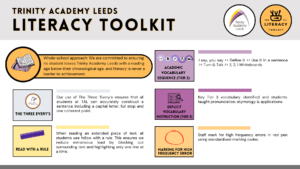
Literacy is at the heart of everything we do at Trinity Academy Leeds, and we have built a strong reading culture underpinned by our consistent, high-quality literacy strategies embedded across the academy. We have a shared vision that all students leave Trinity Academy Leeds as fluent readers, confident writers and articulate orators. We are committed to ensuring that no student leaves Trinity Academy Leeds with a reading age below their chronological age, and literacy is never a barrier to achievement.
Intervention for struggling readers
TAL Library
With almost 3,000 titles available, the students can browse and read fiction and non-fiction books covering a wide range of topics, featuring diverse characters and exploring a variety of issues that interest young people.
The library is open every lunchtime! Students can loan and return books or use the space to immerse themselves in a quiet reading experience. Each student, as part of their English lessons, has taken part in the library induction and introduced to our selection of fiction and non-fiction, as well as a wide range of genres to choose from.
Building Stories
Building Stories takes place every Tuesday during Morning Recall. A member of the English Department will read a novel aloud to the whole year group to enjoy the power of storytelling as a community.
With on-demand streaming services, the concept of serialised storytelling has been lost, so we aim to create those “I can’t wait to find out what happens next week” moments.
This year, students will read:
- Year 7 – ‘Kick’ by Mitch Johnson
- Year 8 – ‘When the World Was Ours’ by Liz Kessler
- Year 9 – ‘Rebel Skies’ by Ann Sei Lin
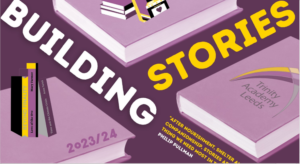
Home Learning (Reading Log)
We encourage our students to read as often as possible and advise them to spend 30 minutes every day reading a fascinating book. They can read anything, from a graphic novel, an edge-of-your-seat mystery or a biography of a ground-breaking innovator.
This year we have also launched Sparx Reader (www.sparxreader.com) to our Year 7 cohort to ensure:
Every student does meaningful, independent reading every week.
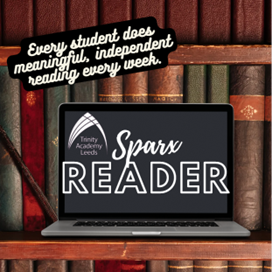
Academic Vocabulary
Our students are exposed to high-level academic texts in every single subject. We ensure that academic words and phrases are explicitly taught so that students are equipped with the skill to use them confidently in a variety of contexts. As part of the process, the learners listen to the teacher modelling the correct use of a word before engaging in a short discussion with a partner and producing a short written response.
Reading Lessons
We have planned a reading programme which uses one hour per week of English curriculum time and is delivered by the English department.
It is a bookletised curriculum, and each lesson has a quality text which has been chosen because it meets our key criteria: literary value; broad range of voices; range of forms and genres; appropriate level of challenge for the year group; compliments and enhances our English academic curriculum.
We follow a 5-step model to explicitly teach effective reading strategies to students:
- Activating prior knowledge
- Read with a Rule
- Echo reading
- Summary
- Explicit vocabulary instruction
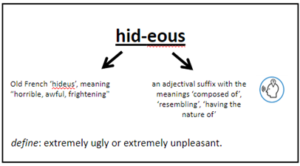
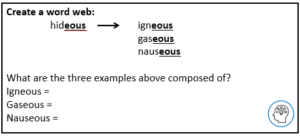
Author Visits
We have had the privilege of hosting Mitch Johnson, the author of Kick, and Liz Kessler, the author of When the World Was Ours.
The students took part in an inspiring assembly with both and were able to chat with the novelists asking them about forthcoming titles and the secrets to writing an award-winning book.
Rob Bradley, world championship-winning freestyle rapper, a published poet and a multiple time TEDx talker, has led a poetry workshop which culminated in four of our students entering and winning the Leeds Secondary Schools’ Poetry Slam 2023!
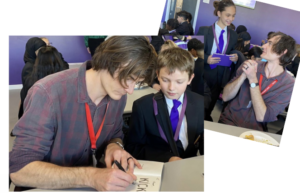
Bilingual Book Buddies
In order to support students who are new to English we use the Penguin Early Reading Programme.
As part of this process, two multilingual students, who share the same first language, read books in English.
Advanced multilingual students support students who might need some help to further develop their reading skills.

